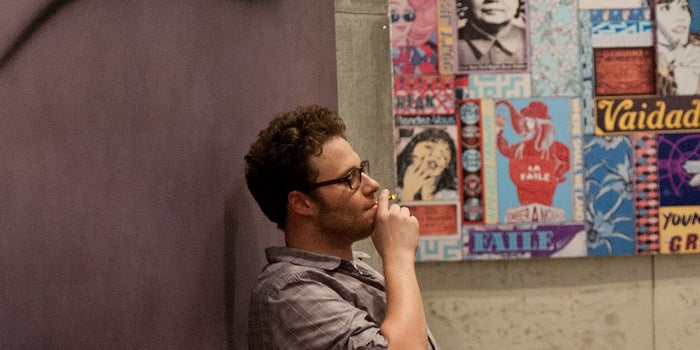You are here
Home 🌿 Recreational Marijuana News 🌿 Introverts, Marijuana, And Getting High During the Coronavirus 🌿Introverts, Marijuana, And Getting High During the Coronavirus

For some people, especially introverts, stay-at-home orders aren’t all that bad.
Although perhaps not OK to admit it in polite conversation, some time alone is doing wonders for many people. This is especially true for those who live in states where officials have deemed marijuana dispensaries essential.
From actor Seth Rogen to Oregon congressional candidate Amanda Siebe, people across the country are firing up at home and sharing their affection for weed on social media. For cannabis entrepreneurs in states where sales are continuing, it’s been a remarkably hopeful time for business. Still, huge hurdles remain for the cannabis industry, which experienced layoffs and contractions all throughout 2019.
There was a highly-publicized run on cannabis when stay-at-home orders first went into place in many states around the country in March. Medical marijuana sales also have increased in places as different as Arizona and Arkansas. Mint Dispensary owner Raul Molina in Tempe told CBS 5 “if you actually drive by our dispensary right now, you'll see a line that wraps around the building.”
For introverts like Seth Rogen, quarantine with cannabis “not bad” experience.
Introverted people can find the normal social world exhausting. That’s why many of them have weathered the stay-at-home orders better than others. This is especially true for those who enjoy cannabis.
If you are searching for a patron Saint of marijuana and isolation, look no further than Seth Rogen. In a recent interview with Jimmy Kimmel, the actor admitted, “I’m really built for this.”
Rogen said he has spent his time under the stay-at-home orders in California engaging in his favorite hobbies: making pottery and ceramics. Those include soap dispensers, which Rogen said seems appropriate for the times.
“We are not all in this together, because this has not been all that bad for me, I’ll be totally honest,” Rogen said. “This has been fine. I am built for this. I’ve kind of been self-isolating since 2009, I think.”
He said he’s been doing “a ton” of pottery and ceramics. And, he quickly added, “I’ve smoked a truly ungodly amount of weed in the time I’ve been in quarantine. More than normal. Thank God it’s been declared an essential service because, for me, it is truly essential. I would describe it as essential.”
He also admitted to introversion. For example, his birthday happened in April, and his wife had some friends drive by and wave at him. “Which I realize, for me, is perfect,” Rogen told Kimmell. “All I want to do is to see everyone for 15 to 25 seconds. I don’t want to get too close.”
Legislators use this opportunity to promote legalization.
Amanda Siebe suffers from chronic pain after being diagnosed in 2012 with Reflex Sympathetic Dystrophy (RSD), also known as Complex Regional Pain Syndrome (CRPS). That’s one reason why Siebe, a congressional candidate in Oregon, backs marijuana legalization. She uses medical cannabis to treat her condition.
During the coronavirus outbreak, she has used her Twitter account to talk about the cannabis plants she is growing or to show herself firing up a joint. That was unheard of behavior for a political candidate in America not that long ago. But Siebe said hiding it would mean she feels ashamed of marijuana use, and she certainly does not.
In reaching such a large audience through Twitter, Siebe is yet another person pushing marijuana legalization into the mainstream of American life.
It is having an impact, especially during the coronavirus when everyone is at home and many may be paying more attention. Cannabis company CEOs told CNBC they believe what has happened during the virus - especially the fact many states declared cannabis an essential business - could pave the way to legalization at the federal level.
Charlie Bachtell, CEO of Cresco Labs, told CNBC that legalizing cannabis also would provide an important tax revenue stream for a federal government that will be looking to right the financial ship after the COVID-19 pandemic ends.
“When we all start to be able to lift our heads from this COVID experience, we are going to be faced with a scenario where a lot of jobs have gone away, a lot of economic development impact has disappeared,” Bachtell said. “How are we going to bring that back? I think cannabis has to be part of that discussion.”
420 Intel is Your Source for Marijuana News
420 Intel Canada is your leading news source for the Canadian cannabis industry. Get the latest updates on Canadian cannabis stocks and developments on how Canada continues to be a major player in the worldwide recreational and medical cannabis industry.
420 Intel Canada is the Canadian Industry news outlet that will keep you updated on how these Canadian developments in recreational and medical marijuana will impact the country and the world. Our commitment is to bring you the most important cannabis news stories from across Canada every day of the week.
Marijuana industry news is a constant endeavor with new developments each day. For marijuana news across the True North, 420 Intel Canada promises to bring you quality, Canadian, cannabis industry news.
You can get 420 Intel news delivered directly to your inbox by signing up for our daily marijuana news, ensuring you’re always kept up to date on the ever-changing cannabis industry. To stay even better informed about marijuana legalization news follow us on Twitter, Facebook and LinkedIn.




